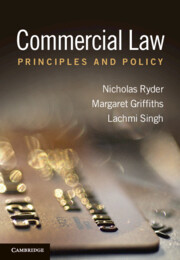Book contents
- Frontmatter
- Contents
- Preface
- List of abbreviations
- Table of Statutory Provisions
- Table of Cases
- Part 1 Agency
- Part 1 Chapter 1 Agency
- Part 1 Chapter 2 The Authority of an Agent
- Part 1 Chapter 3 Relations between a Principal and Agent
- Part 2 Sale of Goods and Services
- Part 3 International Trade and Sales
- Part 4 Tortious Liability for Defective Products
- Part 5 Unfair Commercial Practices
- Part 6 Banking and Finance Law
- Part 7 Consumer Credit
- Bibliography
- Index
- References
Part 1 Chapter 1 - Agency
An Introduction
from Part 1 - Agency
Published online by Cambridge University Press: 05 August 2012
- Frontmatter
- Contents
- Preface
- List of abbreviations
- Table of Statutory Provisions
- Table of Cases
- Part 1 Agency
- Part 1 Chapter 1 Agency
- Part 1 Chapter 2 The Authority of an Agent
- Part 1 Chapter 3 Relations between a Principal and Agent
- Part 2 Sale of Goods and Services
- Part 3 International Trade and Sales
- Part 4 Tortious Liability for Defective Products
- Part 5 Unfair Commercial Practices
- Part 6 Banking and Finance Law
- Part 7 Consumer Credit
- Bibliography
- Index
- References
Summary
Introduction
Part 1 considers one of most important and traditional aspects of any commercial law undergraduate course, the law of agency. Chapter 1 begins by attempting to define the law of agency by providing several examples from commercial law scholars, illustrating the difficulty experienced by the courts in England and Wales in defining the term ‘agency’. The next part of the chapter deals with the nature and characteristics of agency, followed by a brief outline of the different types of agents that exist in the United Kingdom.
What is agency?
It is virtually impossible to provide a clear all-embracing definition of agency. Rather unsurprisingly this has resulted in many commentators arguing that the courts have given it an extremely broad and flexible interpretation. The breadth of the interpretation of the term ‘agency’ is illustrated by the following quotation from an article by Gorton:
In law the concept of ‘agency’ may have different meanings. Whereas in common law ‘agency’ is a wide concept covering the law related to ‘authority’ and ‘power to bind’, the agent in, e.g. Scandinavian law is a particular kind of intermediary. In English law the concept of ‘agent’ may appear in different contexts: ‘commercial agent’, ‘general agent’, ‘del credere agent’, agent of necessity’.
- Type
- Chapter
- Information
- Commercial LawPrinciples and Policy, pp. 3 - 13Publisher: Cambridge University PressPrint publication year: 2012



